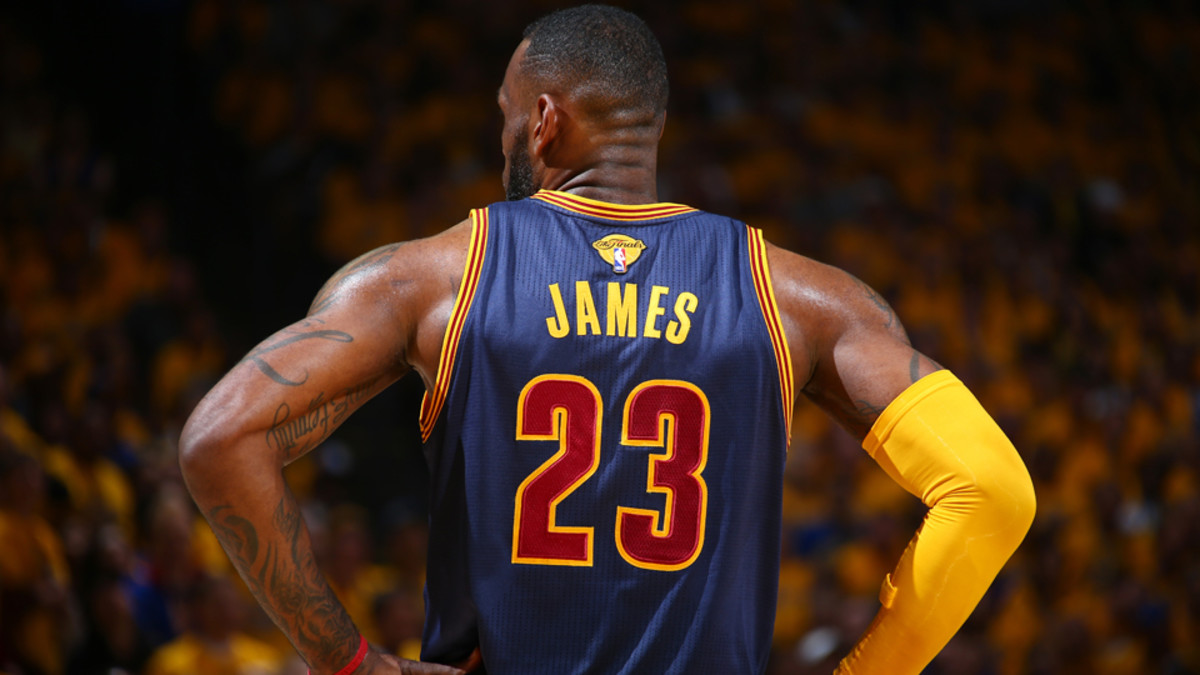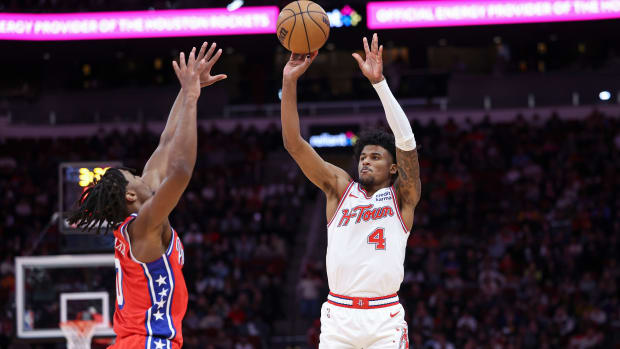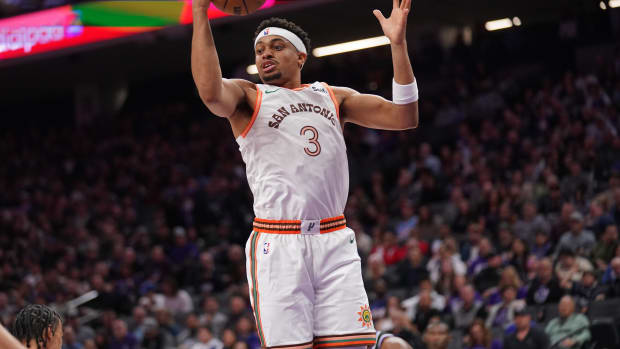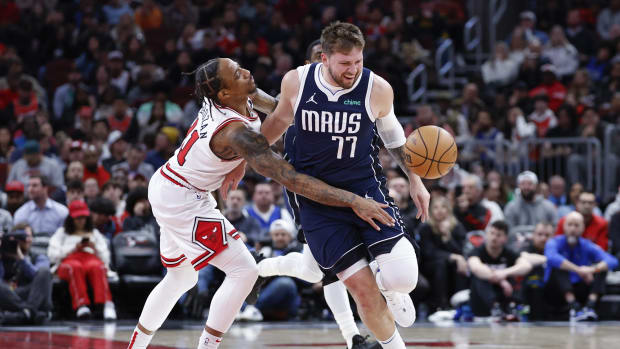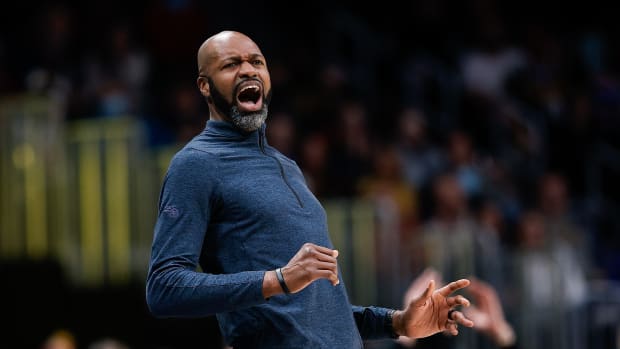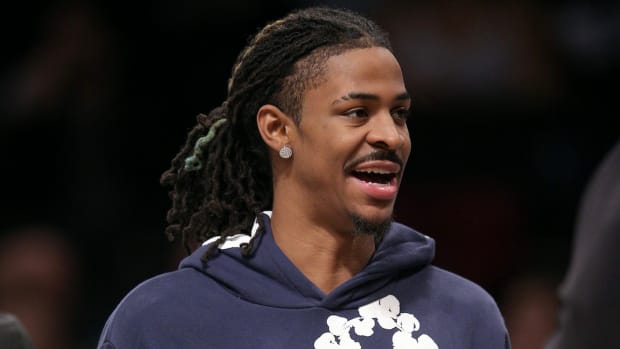LeBron James could join select group of championship MVPs who lost title
The Golden State Warriors are on the verge of defeating the Cleveland Cavaliers in the NBA Finals. But who should win NBA Finals MVP?
Ahead of Game 6, Sports Illustrated's Ben Golliver argued that Cavaliers forward LeBron James deserves to be Finals MVP, even if the Warriors emerge victorious. Through five Finals games, James is averaging 36.6 points, 12.4 rebounds and 8.8 assists per game.
It's extraordinarily rare for a player from a losing team to earn title-round MVP honors. Golliver noted that only one NBA player has accomplished this feat: Lakers guard Jerry West, who was named MVP of the 1969 NBA Finals despite his team losing to the Celtics.
In other professional sports, it's also extremely uncommon: Only a handful of players in the NHL, NFL and MLB have achieved the honor, while the WNBA and MLS have never awarded a title-round MVP to a player from a losing team. Here's a look at the select group LeBron James can join if he wins NBA Finals MVP and the Cavaliers fall to the Warriors, broken down by sport.
• GOLLIVER: Five reasons LeBron should be Finals MVP even if the Cavs lose
NBA Finals
West's performance in the 1969 NBA Finals was nothing short of remarkable. He averaged 37.9 points, 7.4 assists and 4.7 rebounds per game, but the Lakers blew 2-0 and 3-2 series leads. Boston's John Havlicek averaged 28.3 points per game, but no other player on either team even cracked an average of 20.0 points.
In Laker victories, West averaged 44.3 points per game, but he also shined in defeat: In the decisive Game 7, West dropped 42 points.
West, who now serves as an executive board member for the Warriors, is also the only other player besides LeBron James to score at least 40 points in an NBA Finals game while also recording a triple-double. West did it in 1969, while LeBron accomplished the feat this year.
West also was named NCAA College Basketball Final Four Most Outstanding Player in 1959 for West Virginia, even though the Mountaineers fell to California in the title game. Twelve players in Final Four history have failed to win the title but still won outstanding player honors, most recently Houston's Hakeem Olajuwon in 1983. But the NCAA tournament's MOP is awarded based on performance in the Final Four, not just the title game.
• BALLARD: Jerry West's fire burns deep as ever with Warriors
Only one player in Super Bowl history has lost the game but won MVP honors: Cowboys linebacker Chuck Howley in Super Bowl V (1976). The Baltimore Colts defeated the Cowboys 16-13 in a defensive struggle, with the teams combining for 11 turnovers. Dallas lost despite forcing seven turnovers, including two interceptions by Howley.
Colts quarterback Johnny Unitas was injured in the first half and exited the game, making way for Earl Morrall. Howley intercepted both Baltimore quarterbacks.
World Series
The 1960 World Series, a seven-game set between the Pirates and Yankees, is considered by many to be one of the greatest Fall Classics of all time. The Roberto Clemente-era Pirates defeated a Yankees team featuring Hall of Famers such as Yogi Berra, Elston Howard, Mickey Mantle and Roger Maris. But it was Yankees second baseman Bobby Richardson who took home MVP honors. Richardson, who hit .252 with 26 RBIs in 150 regular season games, batted .367 in 30 at bats in seven games against Pittsburgh, recording 12 RBIs and eight runs. He remains the only player from a losing side to be named World Series MVP.
Stanley Cup
The NHL's Conn Smythe Trophy is awarded based on the entire postseason, not just the title round. So it's no coincidence that the award has been given to players from losing teams more often than in other leagues.
Players from losing teams have won the Conn Smythe Trophy on five occasions. Roger Crozier earned the honor for the Red Wings in 1966 despite Detroit losing in six games to the Canadiens. The Blues were swept by the Habs in the 1968 Stanley Cup finals, but St. Louis goaltender Glenn Hall still won the Conn Smythe. The Canadiens also swept the Flyers in 1976, but Philadelphia right wing Reggie Leach won the award after scoring 19 goals during the postseason. Flyers goaltender Ron Hextall won the Conn Smythe Trophy in 1987 even though the team fell to the Oilers in seven games.
Most recently, Mighty Ducks of Anaheim goaltender Jean-SebastienGiguere won the trophy in 2003 after his team lost to the Devils in seven games. Giguere finished the postseason 15-6, saving 94.5% of shots and allowing just 1.62 goals per game. He won all seven overtime games in which he played that postseason.
• JENKINS: How Andre Iguodala helped the Warriors turn the Finals






























